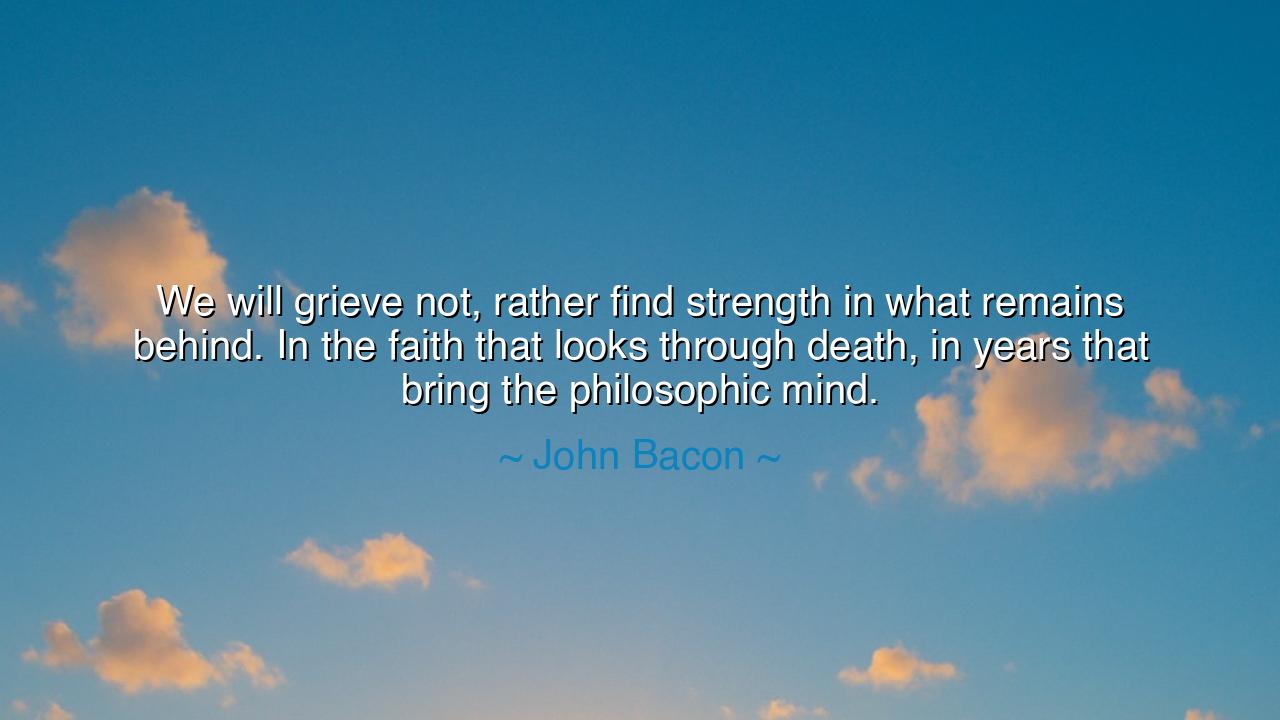
We will grieve not, rather find strength in what remains behind.
We will grieve not, rather find strength in what remains behind. In the faith that looks through death, in years that bring the philosophic mind.






The words of John Bacon — “We will grieve not, rather find strength in what remains behind. In the faith that looks through death, in years that bring the philosophic mind.” — are no mere ornament of speech. They are a torch lit in the cavern of sorrow, a reminder to mortals that though grief descends upon every heart, the path beyond is not one of ruin, but of strength. In these lines, the poet exhorts us not to be chained by mourning, but to rise upon the wings of remembrance, to see in what remains the seeds of endurance and wisdom. It is a summons to courage, a call to embrace the legacy of those who pass from our sight, and to let sorrow be transfigured into vision.
The origin of this utterance lies not in idle musing but in the age-old human struggle with death. Since the dawn of time, men and women have sought meaning in the parting of loved ones. Some wept without end, while others looked beyond the veil, finding in death not annihilation but a passage to eternity. Bacon, like the sages before him, drew from the well of faith, that unseen assurance which dares to look past the grave and behold life everlasting. He teaches us that when years advance, when the tempest of youth calms, there arises the philosophic mind, one that accepts the cycles of nature and finds harmony even in loss.
Think, for a moment, upon the tale of Pericles, leader of Athens. In the plague that ravaged his city, he lost both his sons, the heirs of his house. The people expected his collapse, yet he appeared before them, draped not in despair but in dignity. Though his heart bled, he turned his face toward the city’s needs. He found strength in what remained behind — his people, his duty, his ideals. The faith that looked through death gave him steadiness, and from sorrow was born the wisdom that still echoes across centuries. Thus is Bacon’s truth embodied in history: the noblest spirits are those who turn grief into greatness.
The words also carry within them a profound recognition of time’s gift. In the immediate shadow of loss, the soul trembles; yet, with the slow passing of years, reflection ripens into philosophy. That which once seared with pain becomes a softer flame, illuminating the truth that suffering refines the heart. In such a way, death ceases to be a wall and becomes a doorway — through it, the mind learns endurance, compassion, and serenity. What Bacon calls the “philosophic mind” is the seasoned soul, tempered by tears but no longer shattered by them.
Yet these teachings are not to be mistaken for cold detachment. The exhortation, “We will grieve not,” does not deny sorrow but commands us not to be consumed by it. Grief has its hour, as night has its dominion, but dawn follows with certainty. The remembrance of the departed is not to be drowned in lament, but uplifted in gratitude and in action. To live in honor of what was lost — that is the deeper mourning, the truer tribute. Thus, every tear shed may water the ground from which courage and compassion spring.
Let us then learn this lesson with open hearts: when life strikes with loss, do not allow despair to hollow you. Instead, turn to what remains: to family, to friends, to duty, to the eternal truths that death cannot touch. Strength in what remains is not mere survival, but the alchemy of grief transformed into wisdom. Just as iron is tested in fire, so the soul is tested in sorrow, and by endurance it is made unbreakable.
Practical is this teaching, not lofty only. When you lose, hold fast to memory — but let it inspire, not enslave. Speak the names of the departed, not with despair but with reverence. Build something in their honor, whether small or great: a kind deed, a work of art, a life lived with integrity. When grief threatens to drown you, lift your eyes to the greater horizon, where faith whispers that love and spirit are not extinguished but carried forward. And with each passing year, allow philosophy, not bitterness, to be your companion.
Thus, my children, take this teaching as a lantern for the road ahead. Do not seek to erase grief, but to transmute it. Let death remind you of the fleeting breath, yet let faith remind you of the eternal flame. And when the years mature your soul, may you too stand as one who, touched by sorrow, walks not broken but stronger, crowned with the calm of the philosophic mind.






AAdministratorAdministrator
Welcome, honored guests. Please leave a comment, we will respond soon